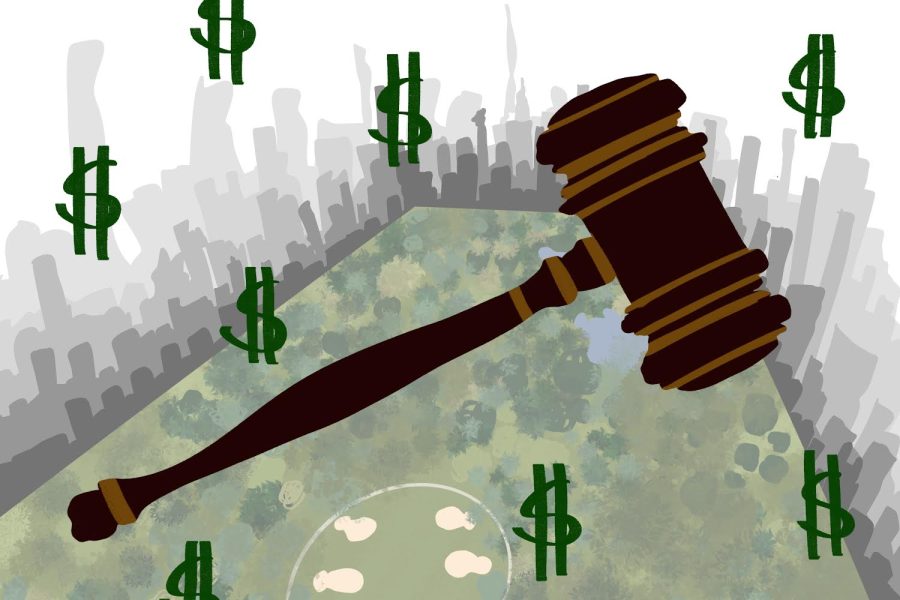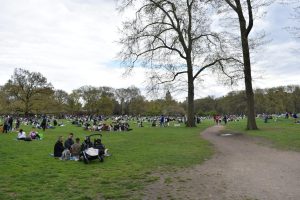Parks Shouldn’t Be Private
The privatization of green spaces puts our beloved parks at risk of degradation
October 26, 2022
Having lived in Queens for practically my entire life, there is no place that I adore more than the park near my house. It is always welcoming, and offers the perfect escape from the bustling city life while simultaneously serving as the local neighborhood hangout. I formed some of my closest friendships at that park, almost all of which have stuck with me until this very day.
Aside from the social benefits that green spaces provide, parks have a multitude of other important uses as well. Having easy access to a park has been shown to reduce stress and increase physical activity. The presence of a green space has also been associated with better air quality in the surrounding area. Green spaces are essential for the structure and function of urban communities, which is why most environmentalists have sought to protect them. However, the privatization of green spaces has been an ongoing cause of debate. By making the transfer from public to private ownership, parks suddenly become open to government and corporate corruption on a much larger scale.
Privatization is often proposed under the guise of development. Some argue that the privatization of certain green spaces can lead to the further expansion of infrastructure and other commodities within the park that could improve the experience overall. However, privatization and policies such as these seldom serve the actual public interest.
One of the most prominent examples of the dangers surrounding privatization can be seen right across the Hudson River at Liberty State Park. In June 2022, the Liberty State Park Conservation, Recreation, and Community Inclusion Act was passed by the New Jersey Legislature to allocate $250 million toward park renovations in addition to creating a committee of advocates to oversee any changes to the park. However, this bill does not explicitly ban the privatization of Liberty State Park. Environmental advocates also fear that the language used in the bill might lead to further privatization, as the park was referred to as an “economic resource” on multiple occasions.
Citizens and individuals who frequent Liberty State Park are concerned that the bill focuses more on the potential revenue generated by structures such as stadiums and amphitheaters rather than actually using money to renovate park spaces, which is what most New Jersey citizens are advocating for. This is a blatant example of the forces of privatization being used to the economic advantage of people in positions of power instead of actually improving the well-being of the park and its surrounding communities.
The privatization of public spaces means no longer being able to hold these private companies accountable for their actions.
The trend toward privatization has been reflected on the national scale as well. In 2019, the Trump administration set out to “modernize” national park campgrounds. Former President Donald J. Trump led an effort to sell 2 million protected acres of land from the national parks for mineral development. He even went so far as to propose the option to receive Amazon deliveries and connect to Wi-Fi in national parks. None of these policies do anything to improve the quality of the green spaces. Instead, they were only brought up as an excuse to line the pockets of the corporations involved. The privatization of public spaces means no longer being able to hold these private companies accountable for their actions.
Overall, the dangers of turning over public spaces to private ownership outweigh any potential “benefits” that these private owners want the average individual to believe in. Upon the privatization of green spaces, there is no longer a democratic vote as to what goes on in these spaces. Private owners have no reason to listen to the concerns of the average citizen. A better alternative would be to keep parks public, in New York City and elsewhere, and allow everyone to enjoy the services they have to offer.














Sean Clark • Jan 15, 2024 at 1:00 pm
The same thing is happening here in New Orleans with our beloved city park.
Currently a park with plenty to offer, event spaces, playgrounds, an excellent museum, boat rentals, two golf courses…
it goes on and on.
After Katrina the board voted to stop publishing the finances of the park and to start calling themselves a “private park.
Recently the director retired and now we have a person who created an llc and called it city park Conservancy.
She points to it talking about how it’s a private buisness and has no money while with the other hand collecting 16 million a year from our property taxes.
Now they have a plan to “fix” our unbroken park by remodeling the entire space, sinking hardwood trees in manufactured lakes and the leftover high ground will be leased to private buisness that no one is asking for.
Being a private business, they don’t need public input anymore, anything they have done concerning the public has been just for show. They allowed the public to see their plan on a Wednesday night for two hours starting at 5 PM ensuring no one would see it.
The whole thing stinks.
Jonathan • Oct 27, 2022 at 12:15 pm
Give me one current example of a privately managed park in NYC where everyone cannot “enjoy the services they have to offer.”